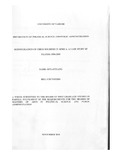| dc.description.abstract | Child soldiers are one of the major problems in modern society. In the case of Northern
Uganda, child soldiers (or formerly abducted children) have been used for decades in the
conflict between the government and the rebel group, the Lord's Resistance Army.
Children in Uganda have continued to be used in conflict situations despite the existence
of international legal regimes that seek to protect them. In the recent past, the conflict has
subsided, most of the rDPs are returning home and most former child soldiers have
returned, escaped or been rescued. Uganda is now facing a great challenge of
reintegrating these children. The purpose of this study is to analyze the reintegration
process of former child soldiers; and to find out whether reintegration process conforms
to international norms and standards, to fmd out the challenges facing reintegration
process and assess the impact of reintegration programmes on former child soldiers. This
is aimed at increasing the understanding of reintegration process. Children's backgrounds
are used as a starting point. Lessons are drawn to help other countries facing the problem
of child soldiering. This study is carried out through contacts with government officials,
members of NGOs, community members and former child soldiers. Data collection
methods include qualitative interviews with government officials, officials from NGOs,
local leaders and formerly abducted children. Human needs and relative deprivation
theories are used as theoretical framework to understand the cause of the conflict in Northern Uganda and to understand the process of reintegration. International and
domestic legal regimes that seek to protect former child soldiers are looked at in details.
Findings from the study are analyzed and presented in thematic form, pie charts, graphs
and tables. Basing on the objectives of the study, it is apparent that the government of Uganda has
developed a programme that is designed to reintegrate former child soldiers into schools.
The study found out that the government of Uganda in collaboration with INGOs, NGOs
and CBOs has implemented disarmament, demobilization and reintegration programmes
for former child soldiers in 26 local communities in Kitgum, Apach and Lira districts in
Northern Uganda. The study recommends that the government of Uganda and LRA
should immediately end all recruitment of children into their ranks. | en |

